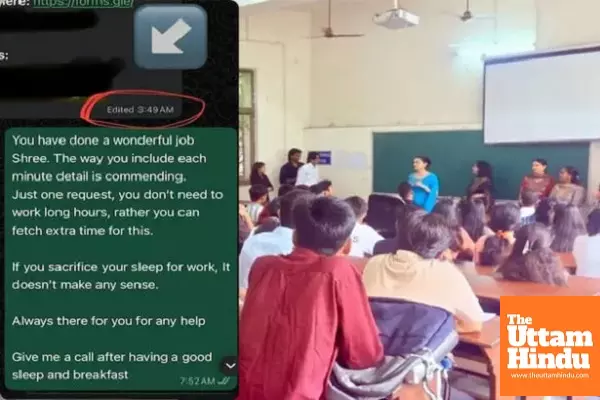
New Delhi(The Uttam Hindu): In an era where hustle culture often overshadows mental health, one Delhi University professor’s thoughtful message has struck a chord across social media. Dr. Kavita Kamboj, an Assistant Professor at Delhi University—who describes herself as a “Gen Z professor”—has gone viral for a heartwarming LinkedIn post featuring a late-night WhatsApp exchange with her student.
The story began when her student, named Shri, sent in her assignment at 3:49 AM, racing to meet a deadline. When Dr. Kamboj checked the message in the morning, she was deeply impressed—not only by the quality and diligence of the assignment but also by the student's commitment to meeting deadlines.
But what caught the internet’s attention was the professor’s empathetic reply. “The work is excellent,” she wrote, “but next time, please prioritize your sleep and health. Don’t let yourself fall into burnout culture.”
Dr. Kamboj’s message emphasized that while she deeply values dedication and deadline discipline, no student should compromise their well-being or sleep to get things done.
Her post quickly resonated with thousands of students, young professionals, and educators online. Many praised her for balancing academic expectations with compassion, and called her the kind of teacher every student deserves.
“Deadlines Matter, But Health Matters More”
In her post, Dr. Kamboj clarified that she isn't against late submissions or hard work—but rather, against the glorification of overwork that often pushes young people into chronic stress, anxiety, and burnout. Her message challenges the toxic productivity mindset that says, “If you’re not working till 4 AM, you’re not trying hard enough.”
Social media users, especially from Gen Z and millennial circles, celebrated the professor’s response, saying it’s rare to find mentors who truly understand modern mental health challenges. “Every manager and professor should take a lesson from her,” one user commented. “This is the kind of leadership we need,” wrote another.
- Tags
- #ViralNews
